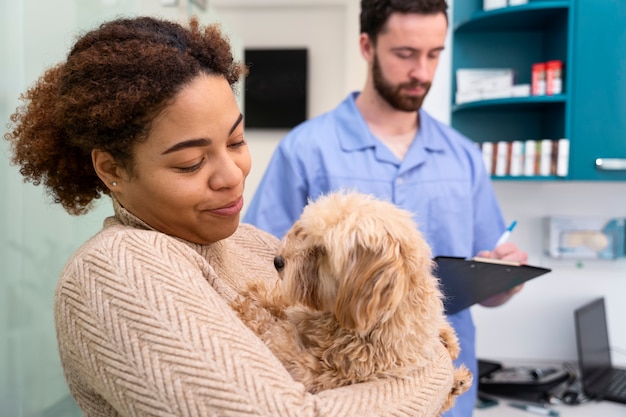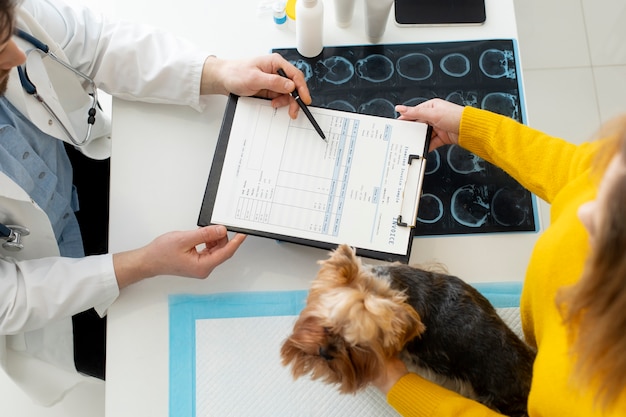Limping in Pets: Causes and When to Call the Vet


Limping in Pets: Causes and When to Call the Vet
If you have ever wondered, “Why is my pet limping?” you are not alone. Limping, or lameness, in dogs, cats, and even exotic pets is a common reason for veterinary visits in Flemington and surrounding communities. At Clover Hill Animal Hospital, located at 240 US 202, Flemington, NJ 08822, our team of veterinarians knows how concerning it can be to see your beloved pet suddenly favoring one leg, slowing down, or struggling with mobility. Whether your pet’s limp appeared out of nowhere after a romp in the yard or has been gradually worsening with age, understanding the possible causes and knowing when to seek help is essential for your companion’s well-being.
In this blog, we will explore the signs to watch for when your pet is limping, common pet lameness causes, treatment options available from your local veterinarian, and important steps for prevention and home care. You will also learn when it is time to schedule an appointment for a comprehensive pet exam or seek more urgent care. If you are searching for “vet near me” or looking for answers about “pet lameness causes in Flemington,” Clover Hill Animal Hospital is here to provide expert guidance and support your pet’s journey back to comfort and mobility. If you are concerned about a sudden or severe limp, our emergency veterinary care services ensure your pet receives prompt attention when it matters most.
How to Recognize Limping in Pets: Signs and When to Pay Attention
Noticing your dog, cat, or exotic pet limping can be alarming, especially if the change is sudden. Limping, also known as lameness, means your pet is unwilling or unable to use one or more limbs normally. Key symptoms include a noticeable favoring of a leg, difficulty rising or moving, a change in gait, reluctance to jump or climb stairs, and sometimes vocalizing when attempting to use the affected limb. For some pets, you might observe swelling, heat, or visible wounds near a joint or paw. In other cases, the only clue may be your pet hesitating to play or acting withdrawn.
It is important to note that limping can look different depending on your pet’s species, age, and personality. For example, an energetic puppy may suddenly stop running and start “hopping” on three legs, while a senior cat may quietly avoid jumping onto favorite perches. Exotic pets, such as rabbits or reptiles, may show subtle changes in posture or movement that signal discomfort. In all cases, consistent observation of your pet’s daily habits is key to catching early signs of lameness.
If your pet’s limp appears after vigorous activity, seems to worsen with time, or is accompanied by other symptoms such as loss of appetite or behavioral changes, it is time to take the situation seriously. A thorough wellness examination at Clover Hill Animal Hospital can help pinpoint the cause and set your pet on the path to recovery.
Why Is My Pet Limping? Common Causes of Lameness in Dogs, Cats, and Exotics
Understanding “why is my pet limping” requires a look at the broad range of pet lameness causes. These can span from minor injuries to chronic conditions, and the underlying issue may not always be visible to the naked eye. For dogs and cats in Flemington and nearby neighborhoods, sudden limping often results from injuries such as sprains, strains, torn toenails, or even insect stings. Other acute causes include foreign objects lodged in the paw, cuts or abrasions, and minor fractures.
Chronic or gradually worsening lameness is more likely to be linked to conditions such as arthritis, hip dysplasia, or ligament injuries. In dogs, a ruptured anterior cruciate ligament (ACL) is a frequent culprit, especially in active breeds. Cats may develop soft tissue injuries or suffer from degenerative joint disease as they age. For exotic pets, factors like improper habitat, nutritional deficiencies, or trauma can also lead to lameness.
Additional causes span from bone fractures and dislocations to more complex orthopedic issues. Sometimes, tumors, infections, or growth abnormalities in younger animals contribute to limping. Environmental factors, including icy winter sidewalks or rough terrain in Flemington, can also increase the risk of injury. If your pet’s limp persists or is accompanied by swelling, heat, or changes in behavior, it is wise to consult our veterinary team for a thorough diagnostic workup.
For pets needing advanced orthopedic assessment, our orthopedic veterinary services in Flemington offer in-depth evaluation and customized treatment plans tailored to your pet’s unique needs.
When Is Limping an Emergency?
While some cases of limping relate to minor strains or bruises, others can signal serious injury or illness. Warning signs that require immediate veterinary attention include a limp that is sudden and severe, the complete refusal to bear weight on a limb, visible bone deformities, uncontrolled bleeding, or signs of severe pain such as crying out or aggressive behavior when touched. If your pet experiences any of these symptoms, prompt intervention can be critical to prevent permanent damage or further complications.
Professional Treatment Options for Limping Pets in Flemington
When you bring your limping pet to Clover Hill Animal Hospital, our veterinarians begin with a detailed physical examination and a discussion of your pet’s history. We may recommend diagnostic tests such as digital radiographs, orthopedic assessments, or bloodwork to pinpoint the cause. Treatment options depend on the underlying problem and may range from simple rest and pain management to more advanced interventions.
For minor injuries, approaches often involve anti-inflammatory medications, restricted activity, and supportive care tailored to the pet’s species and lifestyle. When orthopedic injuries are diagnosed, such as ligament tears, joint instability, or fractures, our hospital offers advanced surgical solutions. Treatment may include ACL repair surgery for dogs with torn ligaments, knee cap dislocation surgery, hip dysplasia surgery, or FHO (Femoral Head Ostectomy) for severe hip issues. Our team also provides fractures and dislocations surgery for pets experiencing complex trauma.
In cases where the limp is caused by soft tissue injuries, infections, or masses, soft tissue surgery may be recommended. For chronic conditions such as arthritis, management involves a combination of medications, joint supplements, weight control, physical therapy, and sometimes alternative therapies like acupuncture or K-Laser therapy, which are available at our hospital.
Throughout the treatment process, we communicate closely with you to ensure that you understand your pet’s diagnosis, options, and expected recovery timeline. Our goal is to keep your pet comfortable and get them back to enjoying life as quickly as possible.
Prevention and Home Care: Supporting Your Pet’s Mobility
While not all cases of limping can be prevented, there are steps you can take at home to reduce risk and promote your pet’s musculoskeletal health. Ensuring your pet maintains a healthy weight is one of the most important factors in reducing joint stress and preventing injuries. Regular, moderate exercise tailored to your pet’s age and breed helps keep muscles strong and joints flexible. For dogs, avoid overexertion on hard surfaces or during extreme weather, as Flemington winters can be especially challenging for older or arthritic pets.
Routine nail trims, paw checks, and grooming help catch small issues before they become bigger problems. Providing comfortable bedding, ramps, or non-slip surfaces in your home supports senior pets or those recovering from injury. Nutritional support, including joint supplements, may benefit pets at risk for arthritis or hip dysplasia.
For exotic pets, it is vital to provide proper habitat, substrate, and dietary support to prevent injuries related to poor husbandry. If you ever notice subtle shifts in behavior, such as reluctance to move or changes in posture, a prompt veterinary evaluation is warranted.
Our wellness care services in Flemington offer preventive health screenings that can identify underlying joint problems before they become severe.
When to Seek Veterinary Care for Limping: Knowing the Right Time
Deciding when to schedule an appointment for a limping pet can feel overwhelming, but timely action ensures the best outcome. If your pet’s limp is mild and resolves within a day or two with rest, monitoring at home may be appropriate. However, persistent lameness lasting more than 24-48 hours, limping that worsens, or any signs of significant pain should not be ignored. Immediate veterinary attention is recommended if your pet cannot bear weight, shows signs of severe distress, or has suffered trauma such as a fall or car accident.
Chronic limping, especially in older pets, is not simply “part of aging.” Early intervention can improve comfort and mobility, prevent further joint damage, and enhance quality of life. If you notice swelling, heat, wounds, or changes in your pet’s general demeanor, a prompt visit to Clover Hill Animal Hospital is the best way to protect your companion’s health.
For pet owners searching for “pet lameness causes near me” or “quality veterinary services near me,” our experienced veterinary professionals are ready to help you determine the best course of action for your pet’s needs.
Supporting Your Pet’s Mobility: Choose Clover Hill Animal Hospital for Quality Care
Limping in pets is a symptom that should never be ignored, as it can signal anything from a mild strain to a serious orthopedic injury. By recognizing the early signs, understanding common pet lameness causes in Flemington, and knowing when to seek professional help, you can ensure your companion receives the care they deserve. Our team of veterinarians at Clover Hill Animal Hospital offers comprehensive evaluations, advanced diagnostics, and a full range of treatment options to restore your pet’s comfort and mobility.
If your pet is limping or showing signs of pain, we encourage you to schedule an appointment with our veterinary team. We are here to answer your questions, discuss treatment options, and provide ongoing preventive care to keep your pets healthy year-round. For those searching for “vet near me,” “pet lameness causes Flemington,” or “orthopedic veterinary services in Flemington,” trust Clover Hill Animal Hospital to deliver compassionate, expert care.
Contact our veterinary professionals at (908) 806-4525 or visit us at 240 US 202, Flemington, NJ 08822 to schedule your pet’s appointment. If you are concerned about sudden or severe limping, our emergency veterinary care services are available for urgent cases. Together, we can help your pets move comfortably again and support their health for years to come.
This blog is for informational purposes only and should not replace professional veterinary advice. If your pet is experiencing severe pain, trauma, or rapidly worsening symptoms, contact your veterinarian immediately or seek emergency care.



















